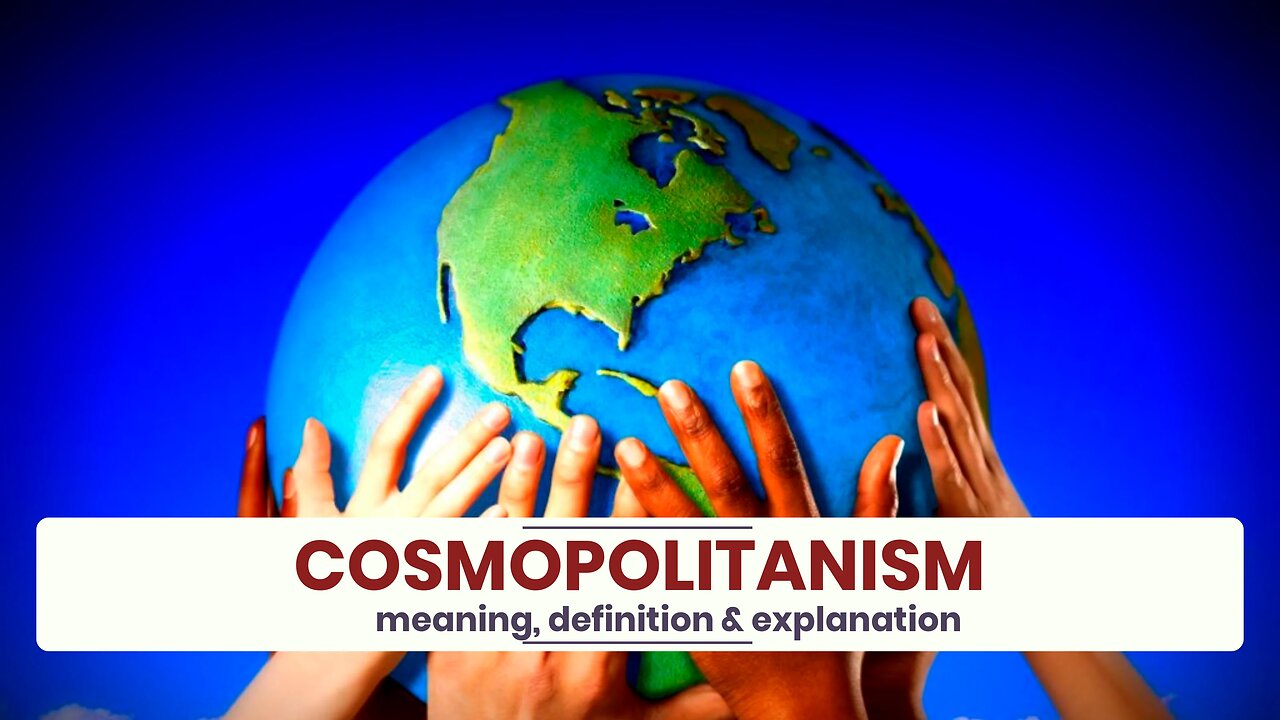Premium Only Content

What is COSMOPOLITANISM?
✪✪✪✪✪
http://www.theaudiopedia.com
✪✪✪✪✪
What is COSMOPOLITANISM? What does COSMOPOLITANISM mean? COSMOPOLITANISM meaning - COSMOPOLITANISM definition - COSMOPOLITANISM explanation - COSMOPOLITANISM pronunciation. What is the meaning of COSMOPOLITANISM? What is the definition of COSMOPOLITANISM? What does COSMOPOLITANISM stand for? What is COSMOPOLITANISM meaning? What is COSMOPOLITANISM definition?
Cosmopolitanism is the idea that all human beings are members of a single community. Its adherents are known as cosmopolitan or cosmopolite. Cosmopolitanism is both prescriptive and aspirational, believing humans can and should be "world citizens" in a "universal community". The idea encompasses different dimensions and avenues of community, such as promoting universal moral standards, establishing global political structures, or developing a platform for mutual cultural expression and tolerance.
For example, Kwame Anthony Appiah articulates a cosmopolitan community where individuals from varying locations (physical, economic, etc.) enter relationships of mutual respect despite their differing beliefs (religious, political, etc.). In a looser but related sense, "cosmopolitan" is also used to describe places where people of various ethnic, cultural and/or religious backgrounds live together and interact with each other.
Definitions of cosmopolitanism usually begin with the Greek etymology of "citizen of the world". However, as Appiah points out, "world" in the original sense meant "cosmos" or "universe", not earth or globe as current use assumes.
In the United States two forms of cosmopolitanism have established. For one, there is a political cosmopolitan nationalism that has defined and constructed other races. On the other hand, ethno-cultural cosmopolitanism that celebrates multiculturalism has benefited from an upswing in the United States after World War II. A definition of cosmopolitanism that handles this issue is given in a recent book on political globalization:
Cosmopolitanism can be defined as a global politics that, firstly, projects a sociality of common political engagement among all human beings across the globe, and, secondly, suggests that this sociality should be either ethically or organizationally privileged over other forms of sociality.
The ancient Chinese philosopher Mozi in preserved scripts said that "universal love and mutual benefit" could be attained "to regard other people's countries as one's own". The Chinese term tianxia (all under Heaven), a metonym for empire, has also been re-interpreted in the modern age as a conception of cosmopolitanism, and was used by 1930s modernists as the title of a Shanghai-based, English-language journal of world arts and letters T'ien Hsia Monthly.
-
 1:26
1:26
The Audiopedia
1 year agoWhat is MOTTO?
50 -
 LIVE
LIVE
Lofi Girl
2 years agoSynthwave Radio 🌌 - beats to chill/game to
229 watching -
 16:22
16:22
BlabberingCollector
2 days agoHarry Potter HBO: Addressing Some New Rumors!
401 -
 4:01:30
4:01:30
Badlands Media
19 hours agoThe Narrative Ep. 37: The Sovereign War
156K32 -
 11:23:54
11:23:54
SpartakusLIVE
12 hours agoMega SOLO Spartan Stream - 12 hours?! HA || Variety Later?!
100K -
 DVR
DVR
Rallied
5 hours ago $15.67 earnedSolo Warzone Challenges All Night
39.3K3 -
 4:53:38
4:53:38
Due Dissidence
15 hours agoTaibbi DEFENDS Weiss-CBS Deal, Pakman Producer SPILLS TEA, Massie CALLS OUT Trump Informant Claims
26.4K34 -
 2:33:47
2:33:47
TheSaltyCracker
7 hours agoMedia Silent on Metro Attack ReeEEStream 9-07-25
142K272 -
 56:27
56:27
Sarah Westall
8 hours agoEnd of Aging, Hydrogen Bomb Research, Serial Killers & Violent Behavior, Bipolar Research w/Dr Walsh
37.2K6 -
 4:36:53
4:36:53
MattMorseTV
10 hours ago $15.67 earned🔴Sunday Gaming🔴
68.4K5